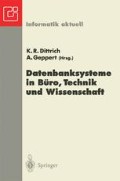Zusammenfassung
F-Logik [17] ist eine mächtige Sprache, die deduktive und objektorientierte Konzepte (Objekte, Methoden, Klassenhierarchie, Vererbung, Signaturen) integriert und eine Reihe weiterer Entwicklungen (z.B. ROL, Gulog, OrLog) beeinflußt hat. Ein Vorzug der F-Logik gegenüber anderen Ansätzen ist die Fähigkeit zur uniformen Behandlung von Daten und Metadaten (z.B. Klassenhierarchie), die sie insbesondere als Grundlage zur Schemamanipulation und Integration heterogener Datenbestände interessant macht. Mit FLORID — F-LOgic Reasoning In Databases — stellen wir eine Implementierung von F-Logik vor. Die Mächtigkeit der Sprache erwies sich als eine große Herausforderung für die effiziente algorithmische Umsetzung. Im vorliegenden Text geben wir anhand eines Beispiels aus dem Bereich Schemaintegration einen Eindruck von der Programmierung mit FLORID und gehen ferner auf die Architektur des Prototyps und einige spezielle Aspekte der Sprache und der Implementierung ein
Die aktuelle Version von FLORID kann per anonymous ftp über den Server ftp.informatik.uni-freiburg.de bezogen werden. Die entsprechenden Dateien befinden sich in dem Verzeichnis /pub/f lorid. FLORID läßt sich auch per WWW über folgende URL beziehen: http://www.informatik.uni-freiburg.de/~dbis/flogic-project.html
Access this chapter
Tax calculation will be finalised at checkout
Purchases are for personal use only
Preview
Unable to display preview. Download preview PDF.
References
M. L. Barja, N. W. Paton, A. A. A. Fernandes, M. H. Williams, A. Dinn. An effective deductive object-oriented database through language integration. In Bocca et al. [3], pages 463–474
J. Biskup, R. Menzel, T. Polle. Transforming an entity-relationship schema into object-oriented database Schemas. In J. Eder, L. A. Kalinichenko, editors,Proceedings of the Second International Workshop on Advances in Databases and Information Systems, Workshops in Computing.Springer, 1995.
J. B. Bocca, M. Jarke, and C. Zaniolo, editors. ProcIntl. Conference on Very Large Data Bases, Santiago de Chile, 1994
Y. Chang, L. Raschid, B. Dorr. Transforming queries from a relational schema to an equivalent object schema: a prototype based on F-logicIn International Symposium on Methodologies in Information Systems, (ISMIS-94), Oct. 1994.
D. Chimenti, R. Gamboa, R. Krishnamurphy, S. Naqvi, S. Tsur, C. Zaniolo. The CVC system prototypeIEEE Transactions on Knowledge and Data Engineering, 2(1), Mar. 1990.
M. Den, S. Morishita, and G. Phipps. The glue-nail! deductive database system: Design, implementation, and evaluationThe VLDB Journal, 3(2): 123–160, Apr. 1994
G. Dobbie and R. Topor. On the declarative and procedural semantics of deductive object-oriented systemsJournal of Intelligent Information Systems, 4(2):193–219, 1995
C. Fahrner and G. Vossen. Transforming relational database Schemas into object-oriented Schemas according to ODMG-93. InProc. Intl. Conference on Deductive and Object-Oriented Databases (DOOD), 1995
Freitag, H. Schütz, G. Specht, R. Bayer. LOLA — ein deduktives Datenbanksystem. In R. Bayer, T. Härder, P. Lockemann, editors,Objektbanken für ExpertenSpringer, 1992.
J. Prohn, R. Himmeröder, P.-T. Kandzia, C. Schlepphorst. FLORID, Version 1.0, user manual, 1996. Available from ftp://ftp.informatik.uni-frei-burg.de/pub/florid/manual,ps.gz.
J. Prohn, R. Himmeröder, P.-T. Kandzia, C. Schlepphorst. How to write F-Logic programs in FLORID, 1996. Available from ftp://ftp.informatik.uni-frei-burg.de/pub/florid/tutorial.ps.gz.
J. Frohn, G. Lausen, and H. Uphoff. Access to objects by path expressions and rules. In Bocca et al. [3].
H. Garcia-Molina, Y. Papakonstantinou, D. Quass, A. Rajaraman, Y. Sagiv, J. Ullman, J. Widom. The TSIMMIS approach to mediation: Data models and languages (extended abstract). InNext Generation Information Technologies and Systems, 1995.
M. H. Jamil,L. V. S. Lakshmanan. A declarative semantics for behavioral inheritance and conflict resolution. InProc. of the 12th International Logic Programming Symposium (ILPS), pages 130–144, 1995.
M. Jarke, R. Gallersdörfer, M. A. Jeusfeld, and M. Staudt. ConceptBase - a deductive object base for meta data managementJournal of Intelligent Information Systems, 4(2):167–192, 1995
D. A. Keim, H.-P. Kriegel, and A. Miethsam. Object-oriented querying of existing relational databases. InProc. Intl. Conference on Database and Expert Systems Applications (DEXA), 1993.
M. Kifer, G. Lausen, and J. Wu. Logical foundations of object-oriented and frame-based languagesJournal of the ACM, 42(4):741–843, July 1995.
P. Kolaitis C. Papadimitriou. Why not negation by fixpoint? InProc. ACM Symposium on Principles of Database Systems, pages 231–239, 1988.
L. V. Lakshmanan, F. Sadri, and I. N. Subramanian. On the logical foundations of schema integration and evolution in heterogenous database systems. In Proc. Intl. Conference on Deductive and Object-Oriented Databases (DOOD), 1993.
M. Liu. ROL: A typed deductive object base language. Proc. Intl. Conference on Database and Expert Systems Applications (DEXA), 1996.
S. Naqvi and S. Tsur. A logical Language for Data and Knowledge Bases. Computer Science Press, New York, 1989.
G. Phipps, M. A. Derr, K. A. Ross. Glue-Nail: A deductive database system. InProc. of the ACM SIGMOD Conf. on Management of Data, 1991.
R. Ramakrishnan, D. Srivastava, and S. Sudarshan. CORAL: Control, relations and logic. In L.-Y. Yuan, editor, Proc. Intl. Conference on Very Large Data Bases, Vancouver, 1992.
R. Ramakrishnan, D. Srivastava, S. Sudarshan, and P. Seshadri. Implementation of the CORAL deductive database system. In Proc. ACM SIGMOD Intl. Conference on Management of Data, 1993
J. Vaghani, K. Ramamohanarao, D. B. Kemp, Z. Somogyi, P. J. Stuckey, T. S. Leask, and J. Harland. The Aditi deductive database systemThe VLDB Journal, 3(2):245–287, Apr. 1994.
P. H. WinstonArtificial Intelligence. Addison Wesley, 1993.
Author information
Authors and Affiliations
Editor information
Editors and Affiliations
Rights and permissions
Copyright information
© 1997 Springer-Verlag Berlin Heidelberg
About this paper
Cite this paper
Frohn, J., Himmeröder, R., Kandzia, PT., Lausen, G., Schlepphorst, C. (1997). FLORID - Ein Prototyp für F-Logik. In: Dittrich, K.R., Geppert, A. (eds) Datenbanksysteme in Büro, Technik und Wissenschaft. Informatik aktuell. Springer, Berlin, Heidelberg. https://doi.org/10.1007/978-3-642-60730-1_7
Download citation
DOI: https://doi.org/10.1007/978-3-642-60730-1_7
Publisher Name: Springer, Berlin, Heidelberg
Print ISBN: 978-3-540-62569-8
Online ISBN: 978-3-642-60730-1
eBook Packages: Springer Book Archive

